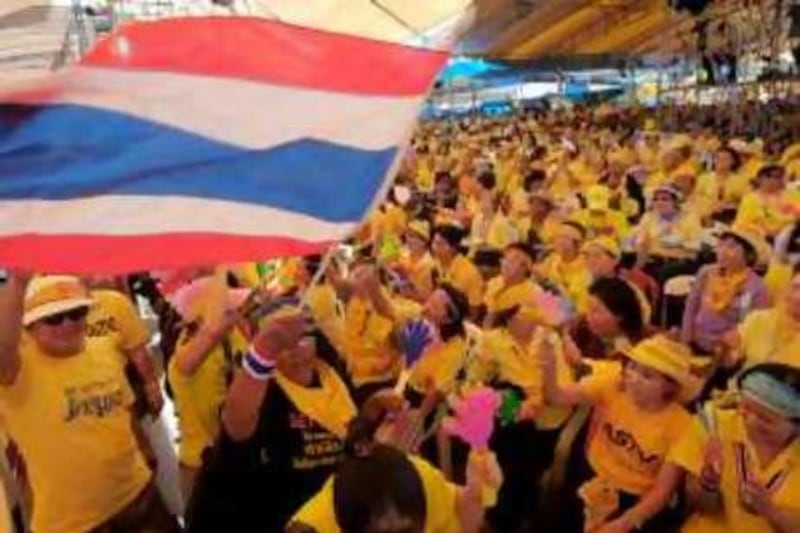BANGKOK // Political tension is rising in Thailand, as anti-government demonstrators begin to prepare for a crucial confrontation with the government. "It's a last-ditch assault on Prime Minister Somchai Wongsawat," Chaturon Chaisang, a government supporter and former deputy prime minister, said in an interview. "They want to provoke the government and create enough violence that the army is forced to stage another coup."
Last week, two people died in separate grenade attacks on the protesters that left more than 60 injured. Since Friday, security has been tightened throughout the Thai capital, with police and soldiers patrolling key commercial areas, including stops on the mass transit system. The renewed confrontation between the government and the protesters, who seized the Government House more than three months ago, comes at time when support for the anti-government movement and its aims has been waning. Recent opinion polls show that the popularity of the group and its actions has fallen by more than 50 per cent in the past few weeks, with the majority of the people wanting an end to the political instability.
The leaders of the People's Alliance for Democracy (PAD) activists have planned mass protests this week in an effort to topple the government, led by the People's Power Party (PPP), which largely represents the interests of Thaksin Shinawatra, the former prime minister. Several trade unions have also called for a nationwide strike on Wednesday, if the government does not resign by then. Though last time this happened, days after the demonstrators invaded key government buildings, few workers, even in the capital, heeded the call.
Yesterday, thousands of activists began to gather behind the temporary barricades erected around the protest base camp near parliament. Tyres were being piled up to provide a protective shield for the protesters. Late yesterday, more than 20,000 activists had assembled in Bangkok for what their leaders called the biggest rally yet and a final showdown with the government. "We are ready for the final push to bring down the government," said Surachai, a retired government official.
"We know it might be dangerous, but we are prepared to sacrifice our lives to preserve democracy. We can't afford to fail at this stage." The protesters camping at the Government House since August are demanding the prime minister resign. They accuse Mr Somchai of being a proxy for Thaksin, his brother-in-law, who was overthrown in Sept 2006 in a military coup for alleged corruption and abuse of power. Last month, the Supreme Court found him guilty of abusing power when he was prime minister to allow his family to benefit financially from a land deal. He was sentenced to two years in jail in absentia. He has been living abroad ever since he went into self-imposed exile and the United Kingdom recently revoked his entry visa.
Thousands of soldiers and policemen have been deployed at the protest site, Gen Anupong Paojinda, the army chief, told journalists on the weekend. More than 3,000 troops are on standby in case there is trouble. The protest leaders are planning another attack on parliament, according to sources close to the top PAD activists. They are concerned that parliament, due to reconvene today, will approve constitutional amendments that will effectively allow Thaksin and more than 100 of his key supporters - who have been barred from politics for five years by the Constitutional Court - to return to active politics, including an amnesty that will ensure the former premier does not serve any jail term.
This will thoroughly defeat the PAD's campaign and it cannot allow this to happen. "The PAD protesters are angrier than ever, particularly after the recent physical attacks on them," said Prof Thitinan Pongsudhirak, a political scientist at Bangkok's Chulalongkorn University. "They are intent on causing havoc and violence in an effort to push the army into action and topple the government. "They are desperate, as they know their broad-base support has fallen away. Their only chance is to create as much trouble as possible and force the army's hands."
The last time the protesters marched on parliament - seven weeks ago - street battles with police left two dead and hundreds wounded. Nearly 100,000 protesters were involved in what was then the biggest anti-government march to that point, which resulted in the country's worst political violence in more than a decade. "We expect far more than 100,000 supporters to join our rally," Parnthep Wongpuapan, a PAD spokesman, said yesterday. Another activist warned that the protests would build a massive crescendo in the middle of the week, without explaining further.
The tension is likely to increase this week. The police will have the main responsibility for keeping the situation under control, but the army will be on standby in case police need help, Col Sansern Khaewkamnerd, an army spokesman, said yesterday. The governing PPP believes a coup is only a matter of time. It has been warning its supporters to expect it and to come out against it. But many military specialists said they believed Gen Anupong would resist efforts to force a military coup as long as there is an option. "Anupong will do everything to avoid taking power - he has clearly said military coups are a thing of the past," Prof Thitinan said. "He'll only move as an absolute last resort - uncontrollable violence." @Email:ljagan@thenational.ae





